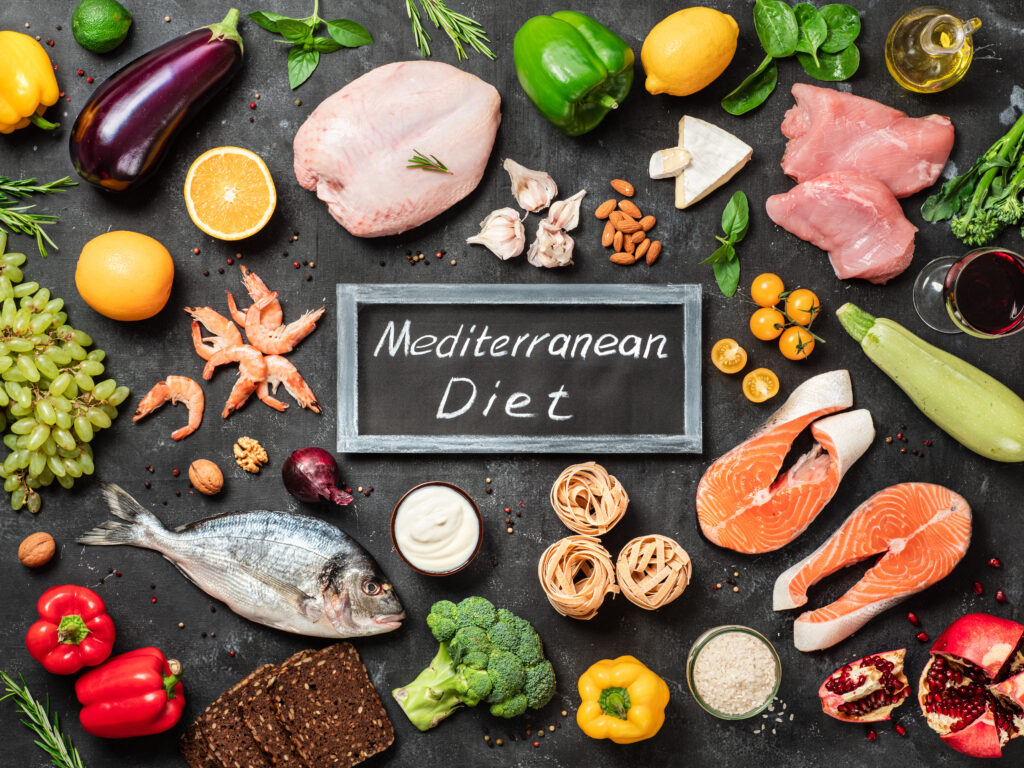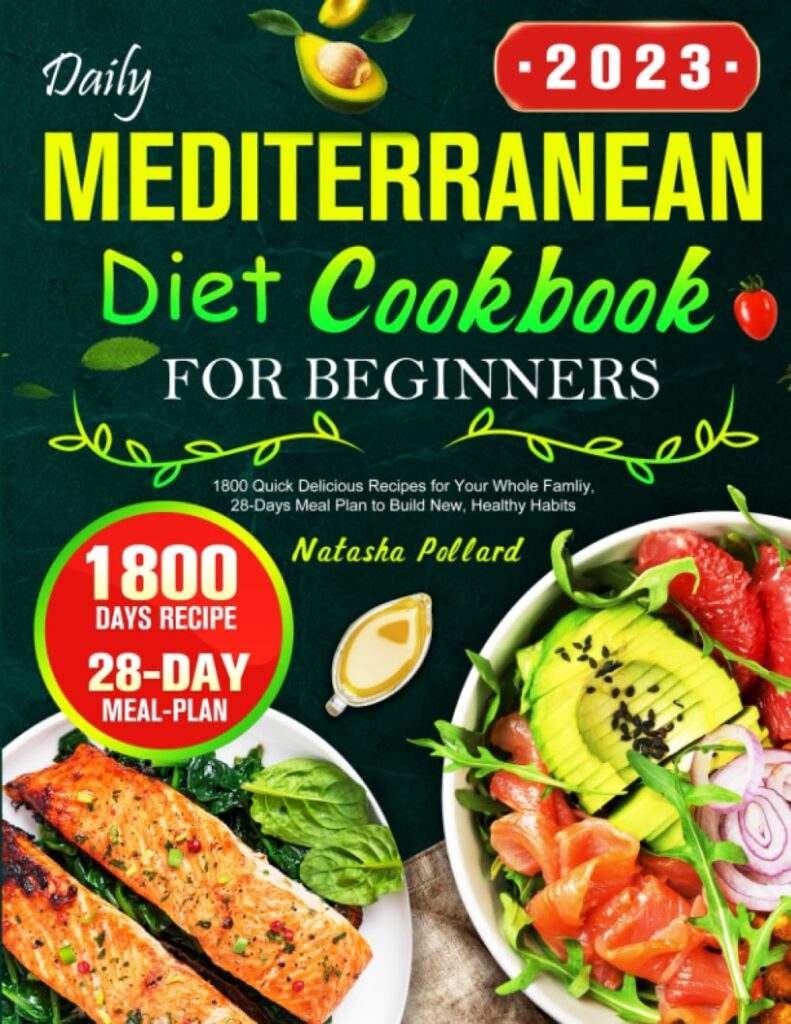What Is the Mediterranean Diet? A Beginner’s Guide
In a world filled with countless diet trends and fads, the Mediterranean diet stands out as a shining beacon of health and longevity. It’s not just a diet; it’s a way of life that has been celebrated for centuries in the Mediterranean region. With its emphasis on fresh, wholesome foods, this diet has gained popularity worldwide for its numerous health benefits.
But what exactly is the Mediterranean diet, and why should you consider adopting it? In this beginner’s guide, we will delve into the details of this delicious and nutritious eating pattern, exploring its origins, key components, and the science behind its remarkable health advantages.
A Brief Summary
Bored of diets that make you swear off your favourite foods? Say hello to the Mediterranean diet – where olive oil flows like liquid gold, and red wine is practically a food group! In our uproarious guide, we’re taking a hilariously delicious tour of this legendary diet that’s been keeping Mediterranean folks happy and healthy for centuries.
Imagine a diet where it’s not just okay but encouraged to dunk your bread into olive oil. Yep, it’s a thing! We’ll show you how to channel your inner Zorba while devouring plates of mouthwatering veggies, grilled fish that could win Olympic medals, and desserts that are the real treasures of Atlantis.
And hey, if you’ve ever wondered why Mediterranean folks live longer, we might just have the answer. Spoiler alert: It’s not just the siestas! So, grab your hummus, dust off your toga (optional), and get ready to laugh your way into a healthier, happier you – Mediterranean style!
How Does the Mediterranean Diet Work?
The Mediterranean Diet works by emphasising the consumption of whole, fresh, and nutrient-rich foods inspired by the traditional eating habits of Mediterranean countries. This balanced diet prioritises fruits, vegetables, whole grains, lean proteins, and healthy fats, particularly olive oil. Its benefits include improved heart health, lower risk of chronic diseases, and a focus on mindful eating and an active lifestyle. By embracing these principles, individuals can enjoy a delicious, sustainable, and health-promoting way of eating.
Health Benefits of the Mediterranean Diet
-
Heart Health: Reduced risk of heart disease is one of the most significant benefits. The diet’s emphasis on olive oil, fish, and nuts promotes healthier cholesterol levels and lower blood pressure.
-
Weight Management: The Mediterranean Diet is associated with weight loss and maintaining a healthy weight due to its focus on whole, nutrient-dense foods and portion control.
-
Lower Risk of Stroke: Following this diet has been linked to a decreased risk of stroke, likely due to its impact on blood vessel health and inflammation reduction.
-
Improved Cognitive Function: Studies suggest that the Mediterranean Diet may protect against cognitive decline and reduce the risk of neurodegenerative diseases like Alzheimer’s.
-
Cancer Prevention: A diet rich in fruits, vegetables, and antioxidants can lower the risk of certain cancers, including breast and colorectal cancer.
-
Diabetes Management: The Mediterranean Diet can help manage blood sugar levels, making it beneficial for individuals with diabetes or those at risk.
-
Better Digestive Health: High fibre content from whole grains, legumes, and fruits and vegetables promotes digestive health and reduces the risk of digestive disorders.
-
Longevity: Mediterranean populations have some of the world’s highest life expectancies, partly attributed to their diet’s protective effects on overall health.
-
Reduced Inflammation: The anti-inflammatory properties of foods like olive oil and fatty fish help reduce chronic inflammation, a common factor in many diseases.
-
Enhanced Mental Well-being: A balanced, nutrient-rich diet can positively impact mental health, reducing the risk of depression and promoting overall emotional well-being.

What Should I Be Eating On The Mediterranean Diet?
1. Abundant Fruits and Vegetables:
The cornerstone of the Mediterranean Diet is an abundance of fresh fruits and vegetables. Aim to fill your plate with colourful, nutrient-packed produce like tomatoes, cucumbers, bell peppers, leafy greens, berries, and more. These foods provide essential vitamins, minerals, and antioxidants.
2. Whole Grains:
Swap refined grains for whole grains like whole wheat bread, brown rice, quinoa, and oats. They offer complex carbohydrates, fibre, and a steady source of energy while promoting satiety.
3. Healthy Fats:
Embrace healthy fats, primarily found in olive oil, which is a staple of Mediterranean cuisine. Use extra virgin olive oil for cooking, drizzling on salads, and dipping bread. These fats are rich in monounsaturated fatty acids, which are heart-healthy.
4. Lean Proteins:
Include lean protein sources like fish and seafood, which are abundant in Omega-3 fatty acids. Additionally, incorporate poultry, beans, legumes, and nuts into your meals for protein variety.
5. Nuts and Seeds:
Almonds, walnuts, sunflower seeds, and other nuts and seeds are excellent sources of healthy fats, protein, and various vitamins and minerals. They make for satisfying snacks or additions to salads and yogurt.
6. Dairy in Moderation:
While dairy is a part of the Mediterranean Diet, it’s usually consumed in moderation. Opt for Greek yogurt, cheese, and milk, but keep portion sizes in check.
7. Fresh Herbs and Spices:
Replace excessive salt with fresh herbs and spices like basil, oregano, rosemary, and garlic. They add flavour and depth to your dishes without the need for excessive salt.
8. Lean Red Meat Occasionally:
Red meat is not off-limits but should be consumed sparingly. Enjoy lean cuts like sirloin steak occasionally, perhaps once a week.
9. Wine in Moderation:
If you drink alcohol, a glass of red wine with your meal can be part of the Mediterranean Diet. However, moderation is key, and excessive alcohol consumption should be avoided.
10. Hydration:
Stay well-hydrated by drinking plenty of water throughout the day. Herbal teas are also a common beverage in Mediterranean culture.
11. Mindful Eating:
Incorporate the Mediterranean way of eating, which includes savouring meals, eating with friends and family, and enjoying the overall dining experience.
12. Limit Sugary Snacks:
Minimise your intake of sugary snacks, and sweetened beverages. These items don’t align with the principles of the Mediterranean Diet.
What Foods Should I Avoid When Following The Mediterranean Diet?
- Butter, margarine and lard
- Biscuits, cakes and pastries
- Sweets and chocolate
- White refined versions of bread, pasta and rice
- Processed meats such as sausages, burgers and bacon
- Red meats
- High-fat cheese, cream and milk

How Many Calories Should I Be Eating On The Mediterranean Diet?
Women are recommended to eat no more than 1500 calories per day, whereas men should eat no more than 1800 calories per day.
Will I Lose Weight?
The Mediterranean diet can be effective for weight loss and weight management. While the Mediterranean diet is not primarily marketed as a weight loss diet, it is associated with several factors that make it conducive to achieving and maintaining a healthy weight. Here’s how:
Eating Out On The Mediterranean Diet
Dining out while following the Mediterranean Diet can be both enjoyable and nutritious. Here are four tips to help you make healthy choices at restaurants:
-
Choose Mediterranean Restaurants or Menu Items: Look for Mediterranean or Greek restaurants, as their menus often align with the Mediterranean Diet. These establishments are more likely to offer a variety of dishes featuring fresh vegetables, lean proteins, and olive oil. If you’re at a non-Mediterranean restaurant, look for menu items like grilled fish, salads with olive oil dressing, and whole-grain options.
-
Prioritise Vegetables and Whole Grains: When ordering, prioritise dishes that prominently feature vegetables and whole grains. Opt for appetisers or sides like Greek salads, hummus with whole-grain pita bread, or tabbouleh. Choose main courses that incorporate plenty of vegetables and whole grains, such as quinoa-stuffed bell peppers or whole-grain pasta with vegetables and a tomato-based sauce.
-
Lean Protein Choices: Select lean protein sources like grilled chicken, fish, or seafood. Avoid deep-fried or heavily breaded options. Ask for your protein to be prepared with minimal oil or butter. Mediterranean cuisine often includes tasty and healthy seafood options like grilled salmon or shrimp kebabs.
-
Mindful Eating and Portion Control: Be mindful of portion sizes, which can be larger at restaurants. Share dishes with a dining partner or ask for a to-go container upfront to save half of your meal for later. Enjoy your food slowly, savouring each bite. This not only aids digestion but also helps you recognise when you’re satisfied, preventing overeating.
Remember to stay hydrated with water or herbal teas and enjoy a glass of red wine in moderation if you’d like. Don’t hesitate to ask the restaurant staff about ingredient substitutions or preparation methods to align with your dietary preferences. Dining out on the Mediterranean Diet can be a delightful experience that allows you to savour delicious and nutritious meals while socialising with friends and family.
Top. 10 Kitchen Staples For Starting The Mediterranean Diet
Stocking your kitchen with Mediterranean diet staples is key to effortlessly incorporating this healthy eating pattern into your daily life. Here are ten essential items to keep in your cupboard:
-
Extra Virgin Olive Oil: The cornerstone of Mediterranean cooking, extra virgin olive oil is rich in heart-healthy monounsaturated fats and adds delicious flavour to dishes.
-
Canned Tomatoes: Keep canned diced or crushed tomatoes on hand for making sauces, stews, and soups. They’re a versatile base for Mediterranean recipes.
-
Whole Grains: Store whole grains like brown rice, quinoa, bulgur, and whole wheat pasta to use as a foundation for Mediterranean-style dishes.
-
Legumes: Canned or dried legumes like chickpeas, lentils, and black beans provide plant-based protein and fibre. Use them in salads, soups, and stews.
-
Canned Tuna and Salmon: These are excellent sources of lean protein and Omega-3 fatty acids. They’re perfect for salads, sandwiches, or pasta dishes.
-
Nuts and Seeds: Almonds, walnuts, pine nuts, and sunflower seeds are great for adding texture and healthy fats to salads, yogurt, and desserts.
-
Herbs and Spices: Stock your spice rack with Mediterranean herbs like basil, oregano, thyme, and rosemary. Ground spices like cumin and paprika can also be handy.
-
Whole Grain Bread and Pita: Whole grain bread and whole wheat pita make for healthy sandwich and wrap options. They’re also great for dipping in olive oil and balsamic vinegar.
-
Vinegars: Balsamic vinegar and red wine vinegar are commonly used in Mediterranean recipes to add acidity and depth of flavor.
-
Dried Herbs and Spices: Keep a selection of dried herbs and spices like bay leaves, cinnamon, and cloves for seasoning and flavoring Mediterranean dishes.
These cupboard staples form the foundation of Mediterranean cooking, allowing you to whip up delicious and nutritious meals inspired by this heart-healthy diet. With these items at your fingertips, you’ll be well-prepared to create a wide variety of Mediterranean-inspired dishes in your own kitchen.
Recommended Cook Book
This Mediterranean Diet Cookbook will give you the answers, with more than 1,800 authentic recipes that will take you on a delicious and healthy journey!
A Typical Day Following the Mediterranean Diet
Breakfast: Porridge with sliced bananas and a sprinkle of cinnamon.
Lunch: Whole-grain pita stuffed with hummus, sliced tomatoes, cucumbers, and chicken.
Snack: Carrot and celery sticks with hummus dip.
Dinner: Mediterranean-style stuffed peppers with turkey mince, rice, and tomatoes. Serve with a side of roasted asparagus.
Snack: Apple sprinkled with cinnamon and a rice cake.
In Conclusion
The Mediterranean diet offers a delicious and sustainable way to improve your health and well-being. By embracing a lifestyle rich in fresh, whole foods, you can experience the benefits of reduced heart disease risk, improved longevity, and a heightened sense of overall vitality. So, why wait? Dive into the world of the Mediterranean diet and savor the flavors of a healthier, happier life.









